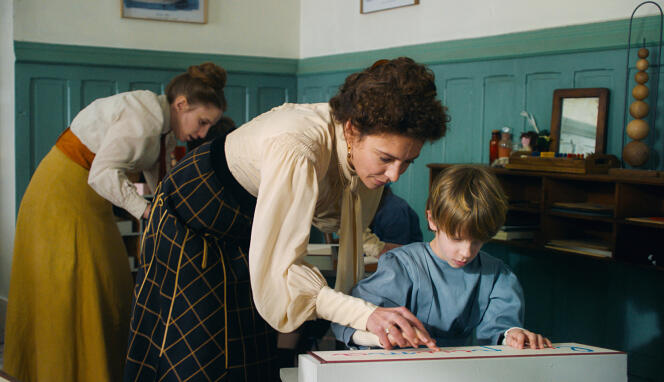June 2022, a delightful little Yvelines castle set in the middle of a wooded park. At the foot of the stone steps, film technicians are busy in jackets with pockets and walkie-talkies in hand. On the gravel path, children with a slightly limping gait arrive in dribs and drabs. They are escorted by their parents, sometimes their grandparents or a specialized educator. They smile and the whole film crew The New Woman, Léa Todorov’s first film, which hits theaters on March 13, welcomes them by their first name.
There are Alice and Baptiste, twins suffering from cerebral palsy. Alvin, a big, moony teenager who has a tendency to escape and steal notebooks. And then Matteo, who sums up, stoically: “To shoot a film, you wait and then you do what you’re told. » There is also Sofia, 6 years old, the director’s daughter, with her colored glasses and her big smile. He was diagnosed with a rare genetic disease at birth. His mother, a documentary director, is filming her first feature-length fiction film here.
The film retraces the early years of the career of the Italian doctor and teacher Maria Montessori (1870-1952). There ” method ” to which it gave its name, and which is today applied in kindergartens and primary schools throughout the world, was first developed in Rome as part of its work with little “idiots”, as they are called. called then. These neuroatypical children, who present psychomotor and developmental disorders of varying severity, are at the heart of the film project. It offers a setting for their poetic singularities, their damaged bodies, their somewhat floating gazes.
The Montessori method applied to filming
It was during a residency that Léa Todorov ” accomplished “, she says, that her film could not exist without children with disabilities taking part. She then met around twenty, through associations and classified ads posted on parents’ networks. “We realized at that moment that we were managing to establish a very powerful bond with children who sometimes have significant difficulties and who have ultimately always been excluded,” she says.
Rafaëlle Sonneville-Caby, who plays Tina on screen, the daughter of a Parisian girl (Leïla Bekhti) placed in a boarding school in the care of Maria Montessori (Jasmine Trinca), is spotted. Fabienne, her mother, says she was instantly seduced by the director’s approach: “From the first meeting with the other parents, on Zoom, Léa talked about the fact that she wanted to work with these children whose profiles are out of the ordinary, to reveal them, legitimize them, to see what they could offer… For us , who live in fear of discriminatory remarks and behavior towards our daughter, she was like a UFO. We know our children, we know that they have resources, but this receives so little response in society. Lending them abilities and ambition before even knowing them… We couldn’t believe it. »
You have 37.82% of this article left to read. The rest is reserved for subscribers.
